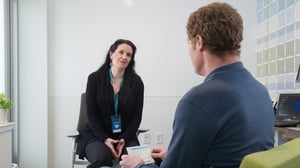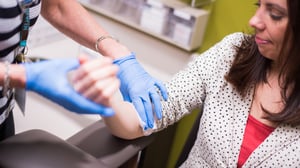A 100-year-old man walks into an insurance office wanting to purchase a life insurance policy.
The receptionist chuckles and says, “Sir, we can’t possibly insure someone who is 100 years old.”
The man replied, “That’s not true; my mother is insured here.”
Surprised, the receptionist says, “How old is your mother?”
“Well, she is 120,” said the man.
“120?! … and is she okay?”
“She’s fine.”
The receptionist tells the man she’ll be right back and goes to speak with her manager.
A few minutes later, the manager appears and says, “Sir, we’ll be happy to issue you a policy. We’ll get the necessary paperwork ready for you to sign. Come back Friday, and we’ll get everything finalized.”
The man replied, “I’m sorry, but I’m busy Friday.”
Curiously, the manager inquires, “You’re busy? You’re 100 years old. What could you possibly be doing on Friday that you can’t make it?”
The man replied, “My grandfather is getting married that day.”
Shocked, the manager asks, “How old is your grandfather?!”
“He’s 150.”
“He’s 150, and he wants to get married?”
The man answers, “Well, he doesn’t want to, but his parents are putting so much pressure on him …”
Apparently, our 100-year-old man in this joke aged in a healthy and strong manner, but can we? While it’s no secret that a healthy diet and regular physical activity can help increase the length and quality of our lives, what about other factors that can play equally important roles? Let’s look at five lesser-known tips for aging strong.
Catch some Zs
 According to The National Sleep Foundation, people over age 65 should get at least seven to eight hours of sleep every night. But as we age, we often experience negative changes in our sleep. Lifestyle changes, poor diet, hormones, pain, medications, or worry, can disrupt sleep.
According to The National Sleep Foundation, people over age 65 should get at least seven to eight hours of sleep every night. But as we age, we often experience negative changes in our sleep. Lifestyle changes, poor diet, hormones, pain, medications, or worry, can disrupt sleep.
Good sleep, however, is just as important as we age as it was when we were younger. It helps our physical and emotional health, improves concentration and memory, allows the body to repair cell damage, refreshes our immune system, supports our metabolism, and even helps our skin age better.
Naturally, if lack of sleep is plaguing you, see your healthcare provider. But in the meantime, here are a few things you can try on your own:
- Start winding down about an hour before going to bed, shutting down all electronics
- Take a bath to help you unwind
- Make sure your room is dark and cool
- Be consistent — go to bed and get up around the same time each day (even on weekends
- Limit alcohol intake for four to six hours before going to bed
- Remove clocks from your bedroom
- Use eye masks or earplugs, if necessary
Make sleep a priority — your health depends upon it.
Sleep is the golden chain that ties health and our bodies together.” — Thomas Dekker
Be a smart mouth
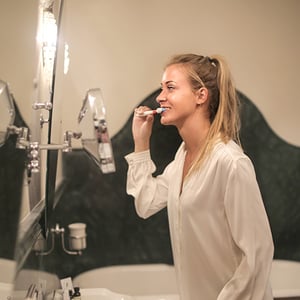 Poor oral health can put you at risk for serious health issues.
Poor oral health can put you at risk for serious health issues.
Kate Osiecki, RDH in Milwaukee, WI, stated, “I think the most important factor of oral health as we age is keeping gums healthy — many people neglect this and just focus on cavity prevention.”
Studies have shown links between poor oral health and cardiovascular disease, respiratory infections, diabetes, dementia, rheumatoid arthritis, and even cancer.
Because the mouth is a primary entryway into the body, bacteria from the mouth can easily get into the bloodstream, causing infection and inflammation wherever it spreads. Your gums are a barrier to help prevent that.
The American Dental Association recommends:
- Brushing your teeth twice a day with a soft-bristled brush
- Replacing your toothbrush every three or four months, or sooner if the bristles are frayed.
- Cleaning between teeth, daily
- Eating a healthy diet that limits sugary beverages and snacks
- Seeing a dentist regularly for prevention and treatment of oral disease
Be smart about oral care.
“Smiling is fun with healthy teeth & gums.” —Prof. Dr. Ninad Moon
Give it up
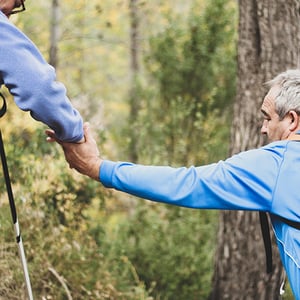 Often described as “The Helper’s High,” the act of giving can boost our health and help us age stronger. Even the smallest gestures of kindness has been shown to bring about surprising physiological and physical results, including:
Often described as “The Helper’s High,” the act of giving can boost our health and help us age stronger. Even the smallest gestures of kindness has been shown to bring about surprising physiological and physical results, including:
- Lowered blood pressure
- Decreased stress and anxiety
- Lowered risk of dementia
- Reduced cardiovascular risk
- Overall greater happiness
When we engage in the act of giving, we stimulate our happiness chemicals, including dopamine (the feel-good chemical), endorphins (that block pain signals), and oxytocin (the tranquility hormone).
Not all giving has to be monetary — giving of ourselves can be just as impactful. Some ideas: help a neighbor with chores or shopping, babysit, give someone a lift somewhere, share a homemade meal, volunteer in the community.
An analysis of data from the Longitudinal Study of Aging found that “individuals who volunteer have lower mortality rates than those who do not, even when controlling for age, gender, and physical health.”
There are numerous ways to give that can mean all the difference in the world to someone, while simultaneously benefitting our own health.
“When you help others, you usually get more than you give.” — Dr. William Sears
Hang out
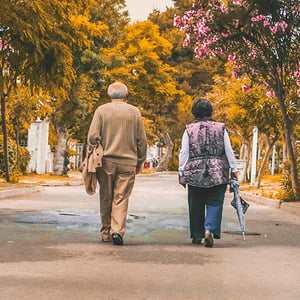 Socializing is an important component of our health and well-being. Interacting with others helps us to thrive and lead fulfilling lives, no matter our age. Studies have shown that socialization also has long-term cognitive benefits.
Socializing is an important component of our health and well-being. Interacting with others helps us to thrive and lead fulfilling lives, no matter our age. Studies have shown that socialization also has long-term cognitive benefits.
According to the American Academy of Neurology and the Mayo Clinic, seniors who are social are at a decreased risk for developing cognitive impairments such as dementia. And a recent research study performed by Harvard University showed that elderly individuals who were socially active were happier, healthier, and more likely to live longer than elderly people who did not have an active social life.
Even in assisted living centers, the importance of socialization is noted. “I’ve seen the overwhelming blossoming of so many residents who were floundering at home by themselves. They find a new purpose in life, want jobs to do, eat well, attend social events, attend church, go to exercise class, go to stores and events using community transportation and find friends to chat with, sit with and care about,” noted Laura Brooker Olson, Executive Director at Morning Star of Fountain Hills, Fountain Hills, AZ.
As we age, however, certain obstacles may impact our social lives: health conditions, limited transportation, no close family members, decreasing social circles, or physical mobility issues, to name a few. Barriers such as these can make it easy to self-isolate, possibly leading to depression and other health conditions.
Even during the pandemic, as socializing is more complicated and less available, it’s important to prioritize a social calendar. People still find connections by reaching out via phone, a letter, or an email. Many older adults are learning how to navigate social media, finding that it is a great way to maintain contact with friends and loved ones. Learning a new craft or hobby can also help connect us to others and form new acquaintances and friendships.
“I have learned that to be with those I like is enough.” — Walt Whitman
Laugh
 As children, we laughed hundreds of times a day, but as adults, it’s merely around 15 times a day.
As children, we laughed hundreds of times a day, but as adults, it’s merely around 15 times a day.
Laughing for health is no joke. Studies show that laughing can help you live a longer, healthier life. Back in 700 BC, the link between laughter and health was also known, as the writer of Proverbs said, “A joyful heart is a good medicine …”
In his book, Anatomy of an Illness as Perceived by the Patient, Norman Cousins calls laughter “inner jogging, because a good-hearted belly laugh gives every system of the body a workout.”
By indulging our sense of humor, we can support our health in various ways, short-term and long-term.
Research has shown that laughter may:
- Improve brain function
- Boost our immune system
- Help alleviate allergies
- Increase blood circulation
- Increase ability to cope
- Stimulate internal organs
- Improve memory
- Burn calories
- Relax muscles
- Strengthen relationships
So, give yourself a respite from the busyness of life and world circumstances of late. Find ways to laugh. Get together with friends, watch a funny movie, read some amusing antidotes, go to a comedy club, or even learn to laugh at yourself. Look for the ridiculousness of a situation that may have you down or choose to be lighthearted about it. Picture your future-self laughing at you now.
“A day without laughter is a day wasted.” — Charlie Chaplin
In conclusion, yes: eat healthily, stay active, and see your healthcare providers for regular health and wellness check-ups. But also remember the not-so-obvious: get enough sleep, take care of your mouth, give, socialize, and laugh. Do the everyday things in life that you can to help you age healthy and strong!
Sign up
Join our email list to receive the latest open positions, Vera Careers news, and more.


